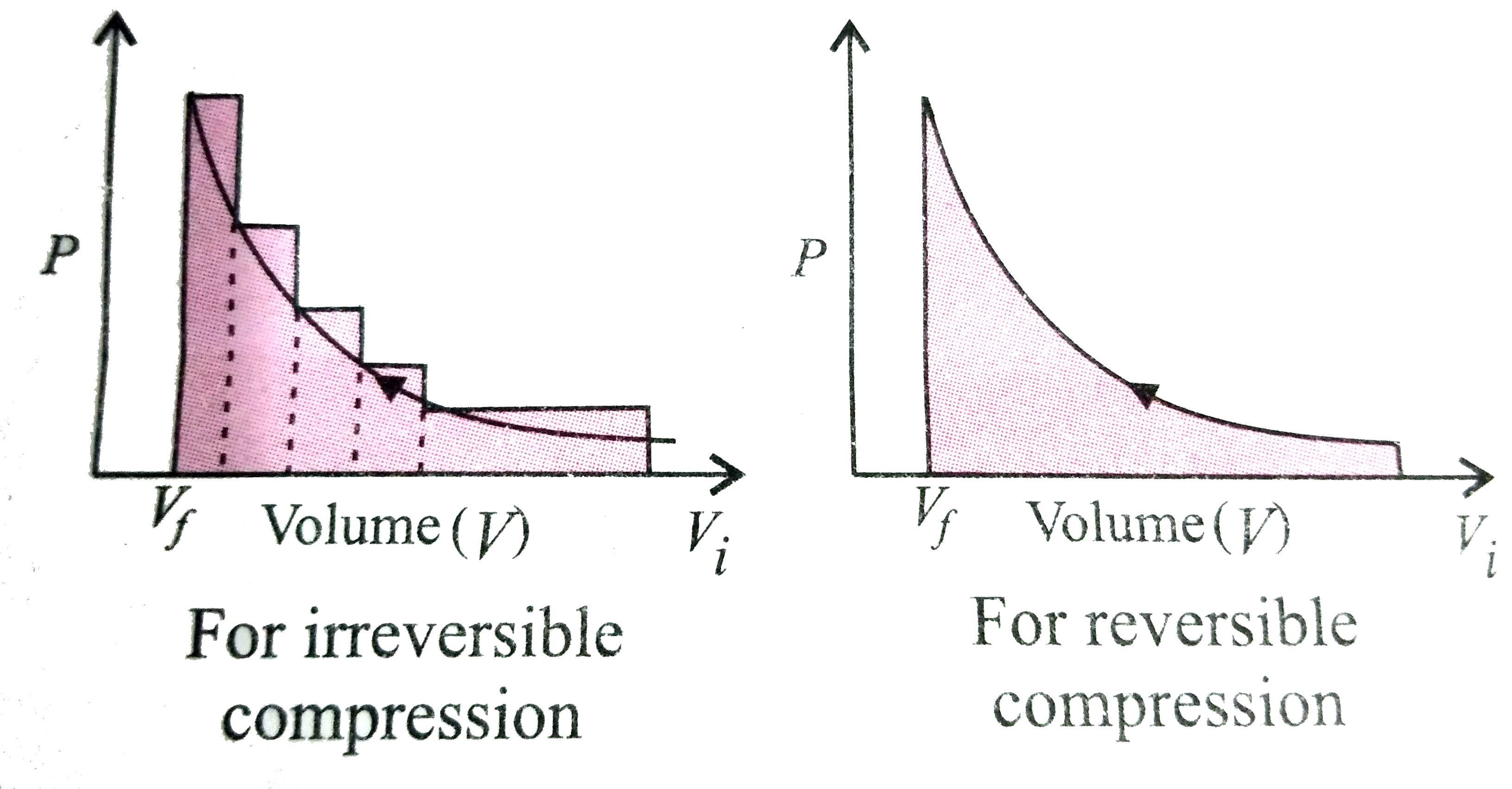The pressure-volume work for an ideal gas can be calculated by using the expression W=−∫VfViPexdV. The work can also be calculated from the pV - plot by using the area under the curve within the specified limits. When an ideal gas is compressed (i) reversibly or (ii) irreversibly from volume Vi to Vf. Choose the correct option.
Wreversible=Wirreversible
Wreversible<Wirreversible
Wreversible>Wirreversible
Wreversible=Wirreversible+PexΔV
The correct Answer is:B

In both the curves, work done on the gas is represented by the shaded area and the area under the curve is always more in irreversible compression.
Hence, Wirreversible>Wreversible
Topper's Solved these Questions
- THERMODYNAMICSBOOK - NCERT FINGERTIPSCHAPTER - THERMODYNAMICSEXERCISE - Assertion And Reason
15 Videos
- THERMODYNAMICSBOOK - NCERT FINGERTIPSCHAPTER - THERMODYNAMICSEXERCISE - Higher Order Thinking Skills
8 Videos
- THE S-BLOCK ELEMENTSBOOK - NCERT FINGERTIPSCHAPTER - THE S-BLOCK ELEMENTSEXERCISE - Assertion And Reason
15 Videos
Similar Questions
The pressure volume work for an ideal gas can be calculated by using the expression w=−∫vfViPexdV. The work can also be calculated from the pV-plot by using the area under the curve within the specified limits. When an ideal gas is compressed (a) reversibly or (B) irreversibly from volume Vi to Vf choose the correct option.
View SolutionWhat is the relation for work done (i) reversibly and (ii) irreversibly for the isothermal expansion of an ideal gas from volume V1 to V2 at temperature T?
View Solution
Knowledge Check
The pressure volume work for an ideal gas can be calculated by using the expression W=−∫VfVipextdV. The work can also be calculated from the pV-plot by using the area under the curve within the specified limits. When an ideal gas is compressed (a) reversibly or (b) irreversibly from volume Vi to Vf. choose the correct option.
AW(reversible)=W(irreversible)BW(reversible)<W(irreversible)CW(reversible)>W(Irreversible)DW(reversible)=W(irreversible)+pext⋅ΔVThe pressure volume work for an ideal gas can be calculated by using the expression w=−∫vfViPexdV. The work can also be calculated from the pV-plot by using the area under the curve within the specified limits. When an ideal gas is compressed (a) reversibly or (B) irreversibly from volume Vi to Vf choose the correct option.
Aw(reversible)=w(irreversible)Bw(Reversible)<w(irreversible)Cw(reversible)> w(irreversible)Dw(reversible)=w (irreversible)+PexΔVThe pressure volume work for an ideal gas can be calculated by using the expression w=−∫vfViPexdV. The work can also be calculated from the pV-plot by using the area under the curve within the specified limits. When an ideal gas is compressed (a) reversibly or (B) irreversibly from volume Vi to Vf choose the correct option.
Aw ( reversible)=w ( irreversible)Bw( reversible) < w ( irreversible)Cw ( reversible) > w ( irreversible)Dw(reversible)=w ( irreversible) +pexΔV
Write the expression to calculate maximum work done when 1 mole of an ideal gas expands isothermally and reversibly from V1 to V2
View SolutionThe pressure-volume work for an ideal gas can be calculated by using the expression w=−∫VfVipexdV.The work can be calculated form the pV- plot by using the area under the curve within the specified limits. When an ideal gas is compressed (a) reversibly or (b) irreversibly from volume Vi to Vf, choose the correct option.
View SolutionThe pressure-volume work for an ideal gas can be calculated by using the expression ω=−∫υ1υ1PexdV. The work can also be calculated form the Pv, plot by using the area under the curve within the specified limits. When an ideal gas is compressed (a) reversiblity or (b) irrevesibly form volume VitoVf choose the correct option:
View SolutionFor an ideal gas, the work of reversible expansion under isothermal condition can be calculated by using expression =−nRTln.VfVi. A sample containing 1.0 mol of an ideal gas is expanded isothermally and reversible to ten times of its original volume, in two separate experiments. The expansion is carried out at 300 K and at 600 K respectively. Choose the correct option
View SolutionA gas expands under constant pressure P from volume V1 toV2The work done by the gas is
View Solution
